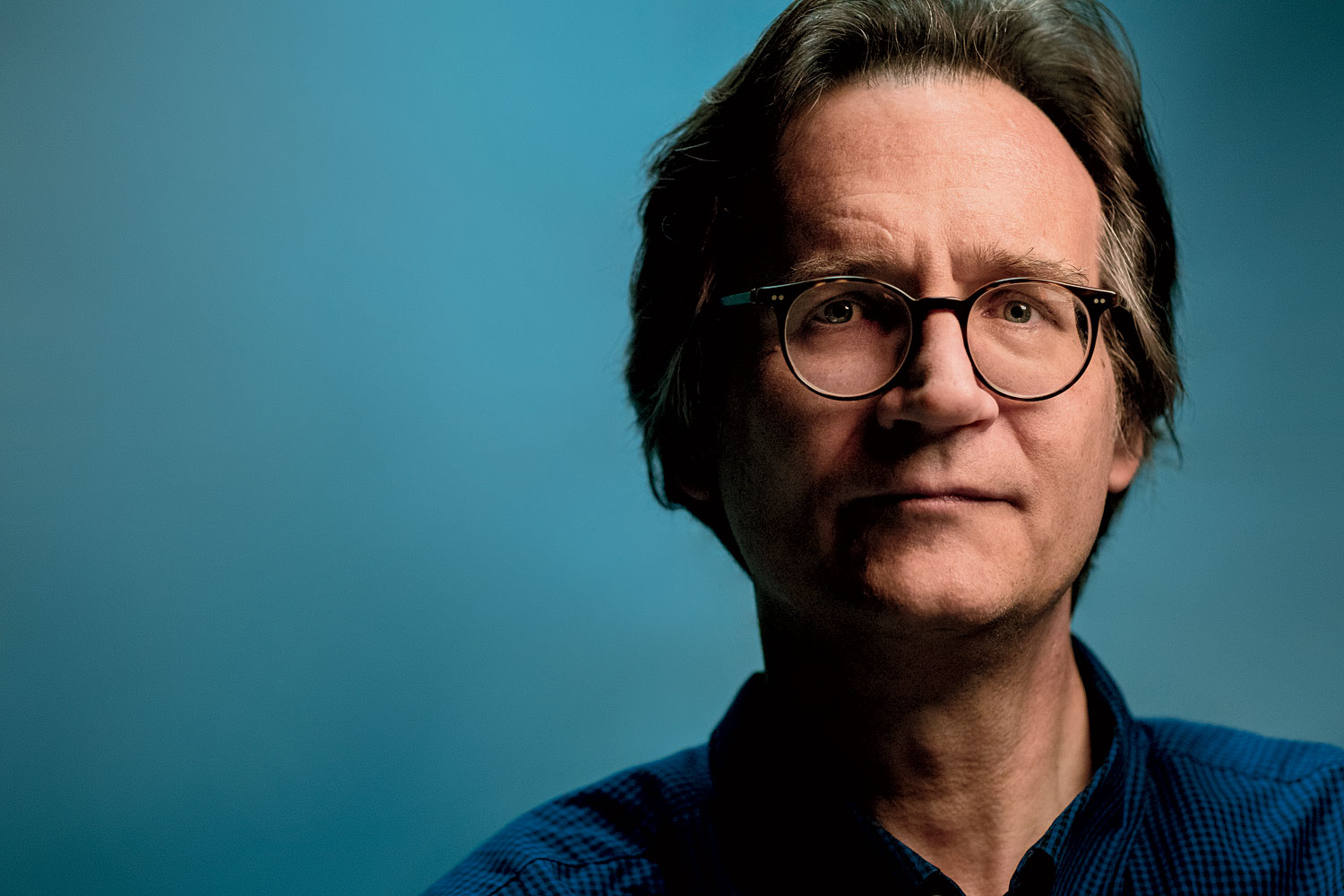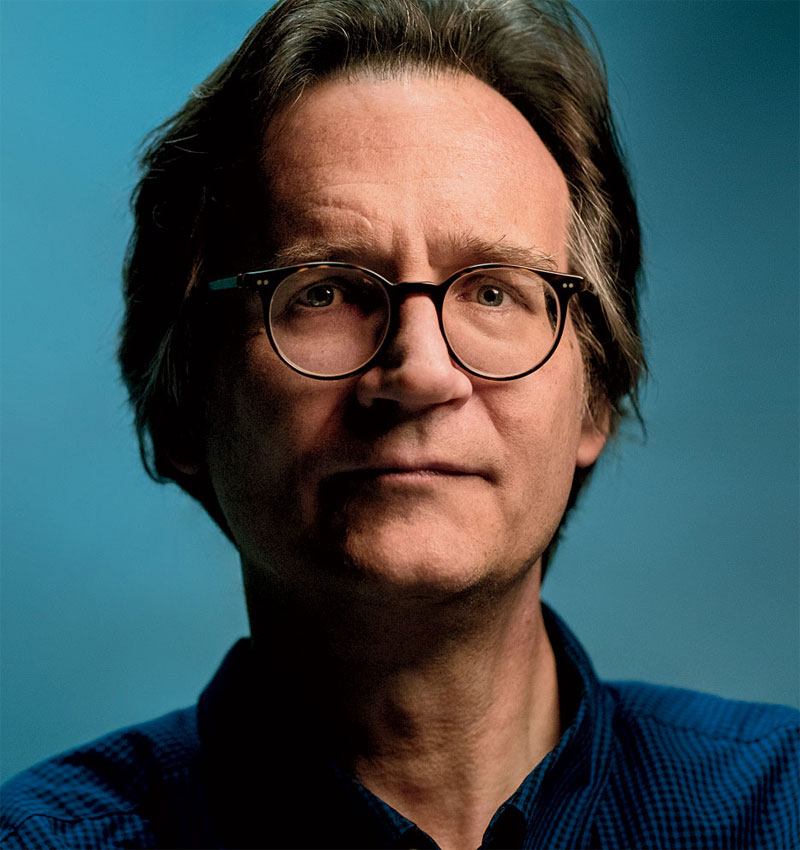My first reaction to the diagnosis was not utter panic. What popped into my head was literally this: Well, at least it’s fashionable; all the best people get cancer. Mine was colorectal—stage 4 because of a couple of spots spread onto the liver. Not one word of which remotely registered in my brain at the time. All I knew was I’d joined a very large and distinguished club. And that’s truly and weirdly what’s empowered me every step of this surreal three-year odyssey.
•
I didn’t know what “stage 4” meant. When the doctors explained it, I heard it through layers of psychological gauze. Mainly, I heard their confidence that I could most likely be cured—with two major surgeries and a whole bunch of chemotherapy before and after. But of course, when I started telling people my cancer was stage 4, they heard it like a death sentence. Because that’s usually what it is.
•
My oncologist told me, “This is your full-time job now.” That’s in the top realm of things you have to come to grips with.
•
With cancer, you always hear the word “battle.” But the first thing I did was surrender myself to my doctors. My attitude was, I’m not going to understand a goddamn thing they’re going to tell me. And it’s too weird to consider who you are under your own hood. But you do want top-notch mechanics figuring it all out.
•
I started spelling “chemo” k-e-e-m-o whenever I wrote it out because I thought that made it sound fun. And then “hot sauce” and “glow juice.” It’s so easy to fall into a vat of hopelessness. You better bring some levity to this. And you better laugh every day. Because if you forget how to laugh, cancer will just spin you out.
•
I drove myself back and forth to keemo. I know it sounds strange, but to be able to do so much of this alone—without the frightened eyes of friends or loved ones on me and instead under the confident, cheerful gaze of the professionals dispensing the keemo—that was important to me. It’s like jumping off the high dive or anything else that’s scary or unpleasant in life—sucking it up and doing it yourself gives you a sense of control.
•
My rule No. 1 from the get-go: Never look anything up on the internet. And to this day, I really haven’t.
•
During my first months of keemo, it was clear that there were massive battles going on inside me, like outright war raging through my blood system. And it was deafening, that war, even though it was inaudible. It was so loud that I didn’t want to compete with it by talking. I needed to be more quiet than I’d ever been before. There was nothing to say.
•
That’s why almost immediately I sought refuge in the Turner Classic Movies channel. I knew there wouldn’t be any commercials jumping in. Never anything overstimulating onscreen. Just gentle enough. Black and white. Safer, simpler times. Loveliness. And by throwing myself into film history, I felt like I was still being productive in a way.
•
Because one complication always led to another, I spent 118 consecutive days in Presence Saint Joseph Hospital—from April 22 to August 18, 2014, the shank of two whole seasons. Except for a handful of those days, I was sealed away in the same 10th-floor room. Room 1045. Without knowing it, I taught myself a certain kind of meditation to withstand it all. I could take myself into a quieter place. I kept the TV off for the first months because I didn’t want the noise. I kept the drapes drawn because I didn’t want the intensity of the daylight. I wanted to feel subdued and Zen.
•
While I was in the hospital, I made it a policy: No visitors allowed, other than a handful of the people closest to me. Mainly just my sister and my 88-year-old dad. Six is too many. I didn’t want the distraction. I didn’t want people trying to cheer me up. I did not have the energy for it. I just wanted to get down eye to eye with this thing and go at it. Outside meddling and second-guessing would have been the end of me.
•
You’ll never be more vulnerable. New people will begin to populate this key stretch of your life. Doctors. Nurses. Technicians. Orderlies. They’ll see and know things about you that you would never dream someone else would. You’d better be nice to these people. These are the most important relationships you’ll have. Don’t waste time on any visitors inclined to snap at the staff and order them around.
•
I thought of myself like a test pilot: Go in, do your mission. You just hope your experience can advance the cause that much further.
•
Truth is, most of the time you are just thinking about your own self. You’re thinking about just getting through it. About survival. About, OK, could it not hurt so much?
•
I’ll mention a name. Nona. She was my physical therapist at St. Joe’s. She was also a yenta goddess. She provided a sense of normalcy to the whole thing, always bursting with crazy family stories to shock and amaze—just breathtakingly distracting. She never stopped casting the movie version of my cancer story; she insisted only Sandra Bullock could play her. She would bring me outside food. Banana Popsicles. Cream soda. Key-lime-pie-flavored Greek yogurt. Real Jewish deli stuff. Anything to lure me into eating, since my weight had dropped 50 pounds during my stay. She found clothes for me the two times I was wheeled outside for fresh air. She took me outside once herself, and my wheelchair broke loose down a sidewalk slope in the front of the hospital. For a second, I thought she’d engineered my prison break. I don’t know what kind of angel she was, but I don’t think it was a coincidence she worked at that hospital while I was there.
•
I think I’m a more benevolent person today because of what I saw from the medical profession. Also, I’m dead right now if Obamacare hadn’t happened when it did.
•
I always thought the colostomy bag was a funny image. And a dependable punch line. Just drop it onto the back end of almost any joke, and it’s good for a laugh. Boy, oh boy, not so much anymore. But it is still funny.
•
I tried to explain my colostomy bag to the young sons of a best buddy who popped in just before I was released from the hospital. “I’m like the man of the future,” I told them. “I can walk down the street and take a poop while I get things done. I can drive to work and take a poop at the same time. I’m talking to you right now, and I’m probably taking a poop. That’s me. Man of the future.” Big hit with 12-year-olds, I promise.
•
When I got out of the hospital, I appreciated people who kept a safe, understanding distance. Who didn’t take it personally if I didn’t answer the phone or an email. Because there’s a new version of you that’s being set out in the world. You’ve been torn apart, then rebuilt. You’re exactly the same, except you’re not the same at all.
•
Whenever I chose to get on the phone with someone, I had to be ready. And being ready is really just being able to sound relatively buoyant. “You sound good!” everybody tells me, which forever cracks me up. Why would I ever want to sound pathetic? How would that help anything?
•
As much as it’s important for me to connect with people, I can’t do it on a mass scale the way I used to. Every time I sit down to write an email, I worry that I now have to explain how I’m doing. So I don’t often write emails. I know people care. But I’ve had it with being rattled to the bone by considering everybody’s expectations of me.
•
The people who are in my life, I love them more than I did before. Even if they don’t hear from me.
•
I can’t watch commercials for cancer organizations. I can’t watch cancer stories on television programs. I will not watch a movie about anyone dying of cancer. I don’t have any use for any of that, even though it’s evidence of the universal condition. I just don’t want to be reminded of how bleak it can feel.
•
While I was sick, I stopped watching whatever I always watched. Kimmel. Letterman, even though I knew it was his last year. I didn’t want the stuff I love to get slimed by the cancer darkness. The few things I did watch when I was in the hospital, for laughs, I can never really watch again. I don’t like Family Guy anymore. I don’t think it’s not funny. I just can’t watch it. Same with Modern Family. I’d watch the Cubs in the hospital, but now mainly just recall a couple of rainy night games that just felt so grim. Like a prison camp. It left this lasting image of Wrigley Field for me. It took me a long time to come back to the Cubbies.
•
I’ve lost my reading room. I used to enjoy going in to sit on the pot. Now I’ve got too much work to do in there—all handled with the utmost care. You damn well better focus like you’re playing with nitroglycerin, because one false move, and you’ve cost yourself a lot of time mopping up.
•
It was an utterly exhausting thing to go through. And to this day, I’m not 100 percent back from that.
•
I’m still walking through the science-fiction fog of it all. My entire world is completely peculiar now. It’s strange to be concerned with the colostomy bag and its contents at all times. Same thing with the neuropathy in my feet, which are in a constant state of electric frozen numbness, a side effect from my posthospital months of keemo. My feet are like beehives. It’s terribly distracting. Marijuana is the only thing that really helps. But one thing I’ve realized is what I call my Frank Sinatra motto: “You’ve gotta keep moving.”
•
I’ll never say, “I’m cancer-free.” I can’t say that without feeling like a delusional asshole. Because this doesn’t feel like a free ride. I’ll always be on alert.




